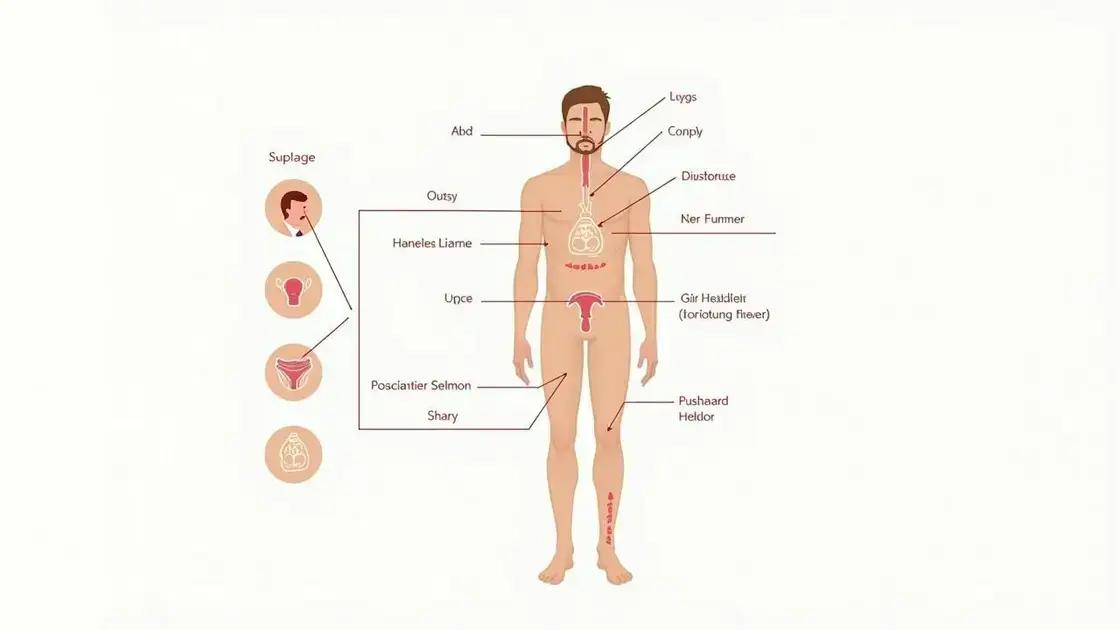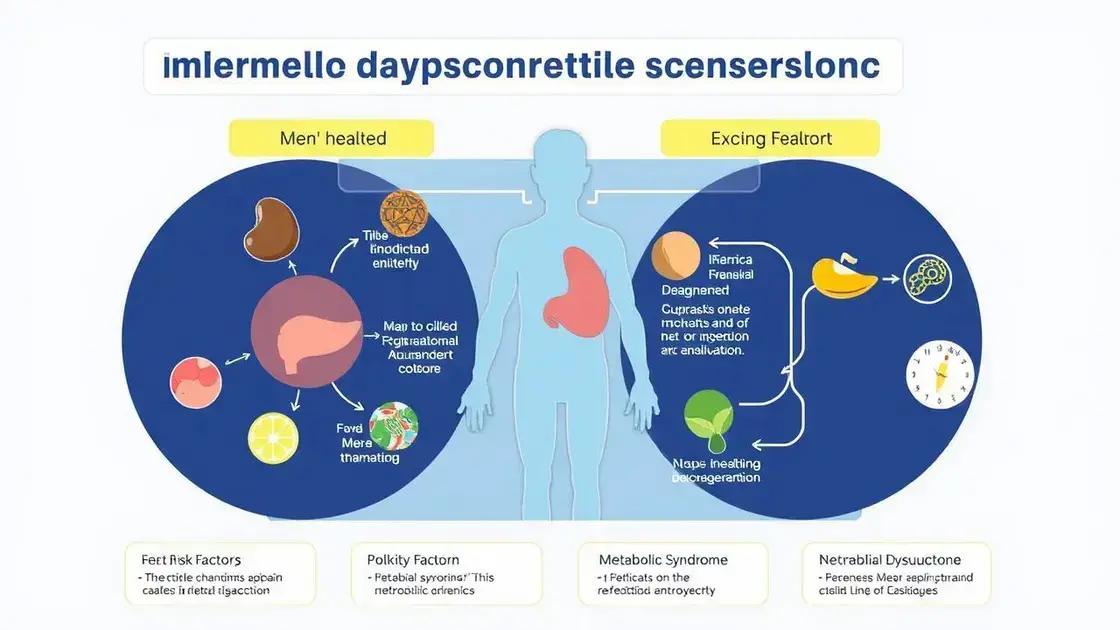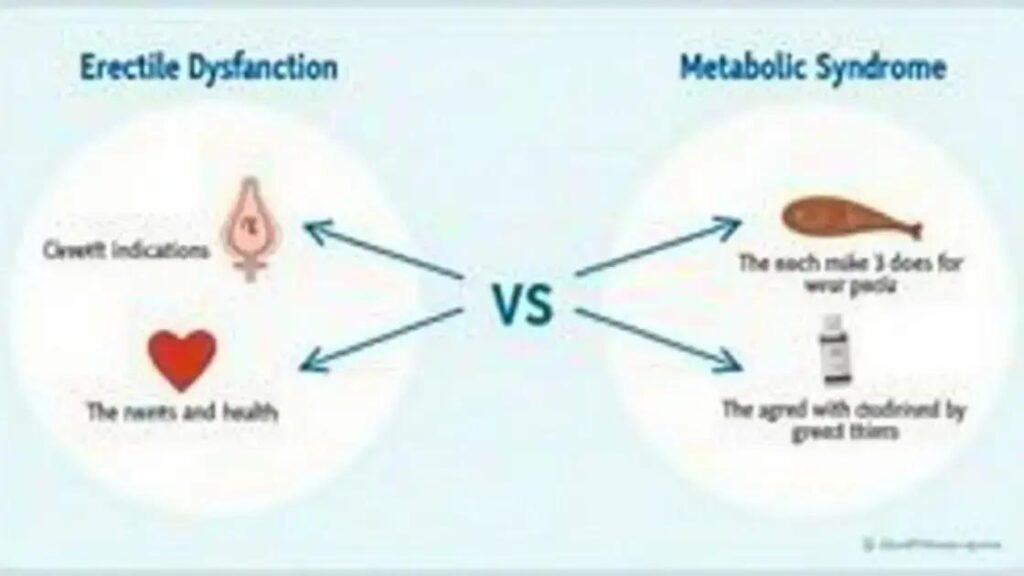Erectile dysfunction (ED) is often related to metabolic syndrome, which includes a combination of conditions like high blood pressure, high blood sugar, and obesity. Addressing these health issues through lifestyle changes such as diet and exercise can improve both conditions, while consulting a healthcare professional ensures tailored treatment and support.
Metabolic syndrome is a serious health condition that affects millions, and it often leads to a perplexing question: how does erectile dysfunction relate to metabolic syndrome? Both conditions share risk factors and can significantly impact your quality of life. In this article, we will uncover the connections between them, explore the symptoms of metabolic syndrome, and discuss how lifestyle changes and medical consultation can help. Understanding these links is crucial for taking charge of your health.
Understanding Erectile Dysfunction

Erectile dysfunction (ED) is a medical condition where a man has difficulty achieving or maintaining an erection. It affects many men, especially as they age, but it is not a normal part of aging. Understanding erectile dysfunction is essential for recognizing its potential causes, including psychological factors, hormonal imbalances, and physical health issues.
Common Causes of Erectile Dysfunction
ED can arise from various factors. Physical causes often include:
- Cardiovascular disease
- Diabetes
- High blood pressure
- Obesity
- Poor circulation
Additionally, psychological causes may be contributing to erectile problems, such as:
- Stress
- Anxiety
- Depression
- Relationship issues
Diagnosis of Erectile Dysfunction
To diagnose ED, healthcare providers will often conduct a physical examination and review the patient’s medical history. Blood tests may also be performed to check for conditions like diabetes or hormonal imbalances. Understanding your risk factors is vital in identifying the underlying cause of erection difficulties.
Impact on Quality of Life
ED can greatly affect a man’s confidence and intimacy with partners, leading to emotional distress. It is important to address the issue openly, as treatment options are available. Seeking support from healthcare professionals can lead to solutions that enhance both physical and emotional health.
The Link Between Metabolic Syndrome and ED

The relationship between metabolic syndrome and erectile dysfunction (ED) is significant and well-established. Metabolic syndrome is a cluster of conditions that increase the risk of heart disease, stroke, and diabetes. These conditions include high blood pressure, high blood sugar, excess body fat, and abnormal cholesterol levels.
How Metabolic Syndrome Affects Sexual Health
Men with metabolic syndrome are more likely to experience ED. The risk factors associated with metabolic syndrome can lead to reduced blood flow and nerve function, which are crucial for achieving and maintaining erections. Notably, insulin resistance can also play a role in sexual function.
Common Risk Factors
Common risk factors that connect metabolic syndrome to ED include:
- Obesity, particularly abdominal fat
- Diabetes or high blood sugar levels
- High blood pressure
- Dyslipidemia, or unhealthy cholesterol levels
These conditions negatively affect blood vessels, leading to poor circulation, which is essential for strong erections.
Systemic Inflammation
Additionally, systemic inflammation associated with metabolic syndrome may have adverse effects on sexual function. Inflammation can damage the blood vessels, impairing blood flow to the penis. This further complicates the ability to have and maintain an erection.
Importance of Managing Metabolic Syndrome
Addressing metabolic syndrome can significantly improve a man’s sexual health. Managing weight, controlling blood sugar, and maintaining healthy cholesterol levels can reduce the impact of metabolic syndrome on erectile dysfunction.
Symptoms of Metabolic Syndrome

Recognizing the symptoms of metabolic syndrome is crucial for early intervention. This condition often goes unnoticed until health complications arise. Key symptoms include:
Abdominal Obesity
One major indicator is excess fat around the waist. For men, a waist measurement of more than 40 inches is often a sign of metabolic syndrome. In women, this measurement exceeds 35 inches.
High Blood Pressure
Blood pressure readings of 130/85 mm Hg or higher can indicate metabolic issues. High blood pressure puts additional strain on the heart and vessels, leading to further complications.
High Blood Sugar Levels
Having a fasting blood sugar level of 100 mg/dL or higher is another symptom. This can signal insulin resistance, a critical component of metabolic syndrome.
Abnormal Cholesterol Levels
Low HDL cholesterol (the good cholesterol) below 40 mg/dL for men and below 50 mg/dL for women is a warning sign. Additionally, elevated triglyceride levels at or above 150 mg/dL can also indicate issues.
Combination of Symptoms
It’s important to note that having any three of these symptoms can indicate metabolic syndrome. Because it is often asymptomatic, many individuals may be unaware of their condition until they undergo health screenings. Regular check-ups can help catch these signs early and prompt necessary lifestyle changes.
Lifestyle Changes for Improvement

Making lifestyle changes is essential for improving both metabolic syndrome and erectile dysfunction. Simple adjustments can have a significant impact on overall health. Here are some effective strategies:
Healthy Diet
Adopting a balanced diet is crucial. Focus on whole foods such as:
- Fruits and vegetables
- Whole grains
- Lean proteins like fish and poultry
- Healthy fats from nuts and avocados
Avoid processed foods that are high in sugar, salt, and unhealthy fats.
Regular Exercise
Engaging in regular physical activity can help manage weight and reduce symptoms of both metabolic syndrome and ED. Aim for at least:
- 150 minutes of moderate aerobic exercise each week
- Strength training exercises at least twice a week
Weight Management
Maintaining a healthy weight is crucial. Losing even a small amount of weight can significantly improve health metrics, including blood pressure and cholesterol levels.
Avoiding Tobacco and Excessive Alcohol
Quitting smoking and limiting alcohol intake can enhance overall vascular health. Both habits can exacerbate symptoms of metabolic syndrome and contribute to erectile dysfunction.
Manage Stress
Finding effective ways to manage stress is important. Techniques such as yoga, meditation, and deep-breathing exercises can help lower stress levels and improve mental well-being.
Incorporating these lifestyle changes can lead to significant improvements in health and quality of life, reducing the impact of metabolic syndrome and erectile dysfunction.
Consulting a Healthcare Professional

Consulting a healthcare professional is crucial for individuals experiencing symptoms related to erectile dysfunction or metabolic syndrome. A medical expert can provide valuable insights, diagnosis, and treatment options.
Importance of a Proper Diagnosis
Recognizing the underlying causes of ED and metabolic syndrome requires professional assessment. Symptoms can overlap, making it essential to identify all contributing factors. Healthcare providers will typically conduct:
- A physical examination
- Blood tests to check for diabetes, cholesterol levels, and hormone imbalances
- Blood pressure readings
Tailored Treatment Plans
Once a diagnosis is confirmed, healthcare professionals can design a tailored treatment plan. This may include lifestyle changes, medications, or referrals to specialists like endocrinologists or urologists.
Open Communication
It is important to have open and honest conversations with your healthcare provider. Discuss all symptoms, concerns, and any medications you are currently taking. This will enable them to provide the best possible care.
Regular Check-Ups
Regular check-ups can help monitor progress and adjust treatment plans as needed. Keeping healthcare providers informed about changes in symptoms is crucial for successful management.
Emotional Support
Consulting a healthcare professional can also provide access to resources for emotional support. ED can cause stress and anxiety, and mental health support may be necessary for comprehensive care.
In Conclusion, Understanding the Connection Between ED and Metabolic Syndrome
It’s crucial to recognize how erectile dysfunction (ED) and metabolic syndrome are linked and can affect your overall health. Addressing these issues requires understanding the symptoms, making lifestyle changes, and consulting with healthcare professionals.
Implementing healthy habits, such as a balanced diet and regular exercise, can significantly improve both conditions. Additionally, seeking medical advice ensures tailored treatment plans that address the unique challenges faced by individuals.
Awareness and proactive health management can lead to better quality of life and restore confidence in one’s sexual health. Therefore, never hesitate to reach out to a healthcare provider for support.
FAQ – Frequently Asked Questions about Erectile Dysfunction and Metabolic Syndrome
What is erectile dysfunction?
Erectile dysfunction (ED) is a medical condition where a man has trouble achieving or maintaining an erection.
How is metabolic syndrome defined?
Metabolic syndrome is a cluster of conditions that includes high blood pressure, high blood sugar, excess body fat around the waist, and abnormal cholesterol levels.
What are the common symptoms of metabolic syndrome?
Common symptoms include abdominal obesity, high blood pressure, high fasting blood sugar, and abnormal cholesterol levels.
How do erectile dysfunction and metabolic syndrome relate?
Erectile dysfunction and metabolic syndrome are linked through shared risk factors such as obesity, diabetes, and high blood pressure, affecting blood flow and nerve function.
What lifestyle changes can help improve both conditions?
Adopting a healthy diet, exercising regularly, managing weight, avoiding tobacco, and reducing alcohol intake can improve both metabolic syndrome and erectile dysfunction.
When should I consult a healthcare professional?
You should consult a healthcare professional if you experience persistent erectile dysfunction or symptoms of metabolic syndrome for proper evaluation and treatment.













